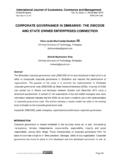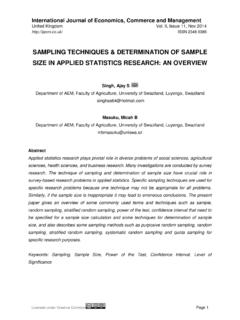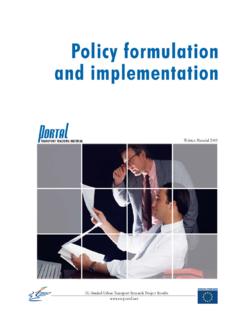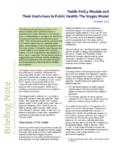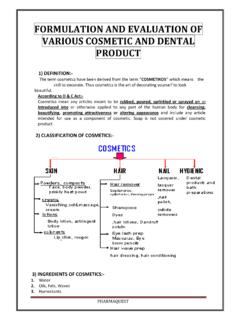Transcription of THE CHALLENGES OF PUBLIC POLICY FORMULATION AND …
1 International Journal of Economics, Commerce and Management United Kingdom Vol. III, Issue 11, November 2015 Licensed under Creative Common Page 830 ISSN 2348 0386 THE CHALLENGES OF PUBLIC POLICY FORMULATION AND evaluation THROUGH THE QUESTIONS WHAT, WHO, HOW, AND WHEN? Thomas Otieno Juma PhD Candidate of Political Science, Kisii University, Kenya Lecturer, Moi University, Dept. of History, Political Science & PUBLIC Administration, Kenya Ken Onkware Senior Lecturer, Masinde Muliro University of Science and Technology (MMUST) and Adjunct Lecturer, Kisii University, Kenya Abstract On the understanding that many scholarly work exist on the CHALLENGES of PUBLIC POLICY , the approach to these have been conventional type of outlining such. The authors of this paper chooses to interrogate the CHALLENGES of PUBLIC POLICY FORMULATION and evaluation using the questions what it is, who is involved, how it is conducted, and when/why.
2 By asking these questions, a number of CHALLENGES are identified and this seems to add some knowledge to the understanding of CHALLENGES to students PUBLIC POLICY , Political Science, Social Studies, and the general readership including practitioners in POLICY issues. This paper further expands PUBLIC POLICY to entail even international POLICY . Keywords: PUBLIC POLICY , Administration, POLICY Analysis, POLICY FORMULATION , POLICY evaluation INTRODUCTION POLICY making is a multifaceted discipline and activity that cannot be adequately considered apart from the environment in which it takes place, the players involved, and why it is being undertaken. Demands for POLICY actions are generated in the environment and transmitted to the society ( PUBLIC - notion for many)/ political system; at the same time, the environment places International Journal of Economics, Commerce and Management, United Kingdom Licensed under Creative Common Page 831 limits and constraints upon what can be done by policymakers.
3 Included in the environment are such geographical characteristics natural resources, climate, and topography; demographical variables like population size, age distribution, and spatial location; political culture; social structure; and the economic system. In addition to these factors, the reason why it is developed is paramount. BACKGROUND It is our thinking that it is imperative for many readers today that the scope of PUBLIC POLICY may not only be confined to PUBLIC meaning of subjects within the states but a necessary expansion of the terminology in this neo-liberal regime need to take cognizance of it expanding to include the global PUBLIC . Decisions pertaining this second paradigm have in the years after the Cold War accelerated and cannot be isolated. The similarities that govern policies to this bigger PUBLIC frame are enormous despite the constant conflict between this and the realism view that narrows PUBLIC to actors within the state.
4 All the same, architect of the word PUBLIC postulated its meaning to surround many people. The Greek word polis , and Latin and old French words publicus/poplicus (of the people) / populous (for people) are not confined to scope of PUBLIC except all usage surround existence of people. By all means, POLICY and especially PUBLIC POLICY has a lot of relevance to practice of politics in a state, which is both its internal and external dynamics. This means it also forms a significant part of foreign and defense policies of states. The argument looks as states as entities of the systemic unit. Because of this mix. PUBLIC POLICY Analysis often involves a deep evaluation into aspects such as the Socio- eco- political factors and extensively into the environmental factors too. This means PUBLIC POLICY making/ FORMULATION has myriad CHALLENGES more probably than those related to implementation.
5 It raises questions of why is it being formed, whose interest, what procedures, and why now and not other time? The nature of such questions spreads into the mix of social, economic, and environmental issues which in totality meet within a political web of issues. PUBLIC POLICY conceptualization from formation, implementation and evaluation , requires a focus of the basis of the idea behind the move which normally might be generation of relevant information to resolve social problems. This drive leads the necessity to list as Eneanya, Belo, and Anifowose (2010) the good elements of good PUBLIC POLICY ; Validity Validity, in general, refers to being accurate. In the context of POLICY analysis, validity refers to the internal consistency of logically drawing a conclusion that follows from the goals, Thomas & Ken Licensed under Creative Common Page 832 policies, and relations, the external consistency with empirical reality in describing the relations between the alternative policies and the goals; the policies being considered encompass the total set of feasible alternatives (feasibility in this context refers to being capable of being adopted and implemented by the relevant POLICY makers and POLICY appliers); and the listed goals include all the major goals and only the goals of the relevant POLICY makers in this context.
6 Importance The concept of importance can be defined in two ways. First, does the research deal with issues on which there are big societal benefits and/or big societal costs being analysed? Second, does the research deal with a subject matter or a set of causal hypotheses that potentially have broad explanatory power? This is theoretical importance, as contrasted to POLICY importance. Usefulness Usefulness as its lowest level involves doing POLICY research that is not referred to by the people who make POLICY in the subject-matter area. At the next level is research referred to by POLICY makers orally or in a citation, even if the research cited is not on the winning side. At a higher level is research that reinforces pre-conceived decisions. POLICY researchers should be pleased if their research accelerates a worthwhile decision that otherwise might be delayed.
7 At the highest level is the rare case of POLICY research that converts decision makers from being negative to being sensitive, or vice versa, on an issue. Originality Originality refers to the extent to which POLICY research differs from previous research, although even highly original research builds and synthesizes prior research. Feasibility Feasibility is an additional criterion for judging proposed POLICY research, as contrasted to completed POLICY research. Feasibility is concerned with how easily research can be implemented given the limited time, expertise, interest, funds, and other resources of he researcher. POLICY definitions can take different forms. There is thrust to designate POLICY as the outputs of the political system, and in a lesser degree to define PUBLIC POLICY as more or less International Journal of Economics, Commerce and Management, United Kingdom Licensed under Creative Common Page 833 interdependent policies dealing with many different activities.
8 Dror (1968) defines policies as general directives on the main lines of action to be followed . Summarily, the concept of POLICY is not really precise. It denotes, among other elements, guidance for action. It might hence mean; a declaration of goals, course of action(s), general purpose; and authoritative decision. The essence of PUBLIC POLICY is society. Societies however are made of cultures which are their distinguishing mark as far as value laden basis is concerned, life styles of its members from those of other societies, and action. Clyde Kluckhohn (1963:24) defines culture as the total life way of a people, the social legacy the individual acquires from his group. On the other hand, culture is that part of the environment that is a creation of man (1965). This definition is important because from it one understands that culture shapes or influences social action.
9 It is clear that what influences does not necessarily determine a particular action, it can only be one among many factors affecting social behaviour. PUBLIC POLICY analysis, therefore, has been variously defined by scholars. Eneanya, Belo, and Anifowose (2010), says it is any type of analysis that generates and presents information in such a way as to improve the basis for POLICY -makers to exercise their judgment. On his part Chandler and Plano, (1988:96) posit that POLICY analysis involves systematic and data-based alternative to intuitive judgments about the effects of POLICY or POLICY options . Ikelegbe (1994:5), defines it as the study of the causes, processes, formation, implementation and consequences of PUBLIC POLICY . Dye (1976) defines POLICY analysis as finding out what governments do, why they do it and what difference it makes . Environment ties a people to a uniform economic, social, and political culture.
10 As far as PUBLIC issues are, it can be justified that political culture is superior. Reasons behind this can emanate from the theories of state such as social contract and force theories. Designated as political culture may mean widely held values, beliefs, and attitudes concerning what governments and their actions, and the ensuing relationship between a people and government. Political culture is trans/inter-generational behavior shared through a socialization process over time. The concept of PUBLIC POLICY makes aloud presupposition that there is an area or domain of life which is not private or purely individual, but held in common. It therefore ushers in a conflict of individual versus many. Mine vis a vis ours. The PUBLIC dimension is generally referred to PUBLIC ownership or control for PUBLIC purpose.







